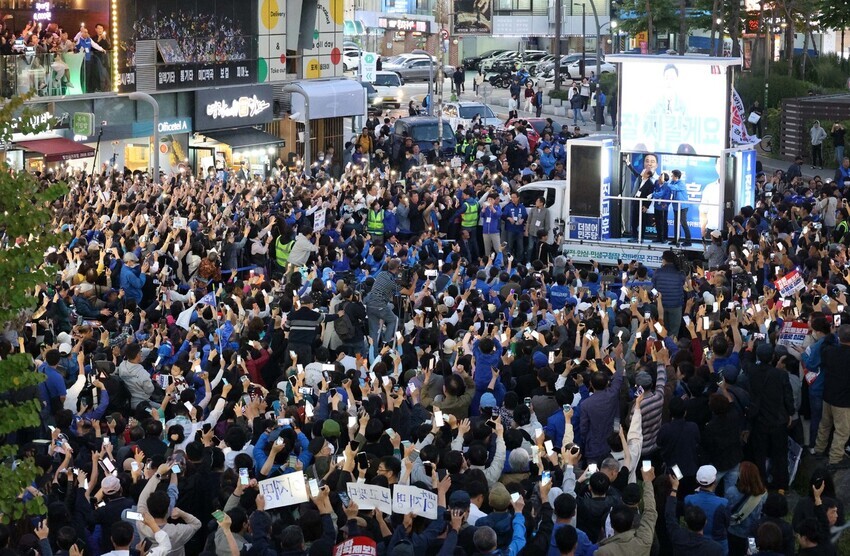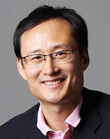hankyoreh
Links to other country sites 다른 나라 사이트 링크
[Column] PPP’s nomination in Gangseo by-election was an own goal — and a sign of an administration in decline


The nature of power is something like the moth that is drawn to the flame, knowing full well that it will end up getting burned. The by-election race for the chief of Seoul’s Gangseo District Office is a symbolic case.
The defeat of the People Power Party (PPP) was foreordained from the moment the district’s former mayor, Kim Tae-woo, was nominated last month. Does it make any sense at all to pardon and reinstate someone to run as a candidate again in an election that is being held in the first place because of his conviction? It’s a misstep that the Yoon administration took without hesitation.
It’s not as though no one from that circle was expressing concerns. One PPP figure said, “Quite a few in the party thought we shouldn’t field a candidate, since we were the ones responsible for the election being re-held. But after the president made such a big production of pardoning and reinstating Kim Tae-woo, there was no choice but to make a nomination.”
Since before the election campaign officially kicked off, there had been talk in and around the party about Kim trailing by a significant margin in internal PPP opinion polls.
When a moth flies into the flame, it must do so because it believes that it won’t ever get burned. That sort of misunderstanding and arrogance now has the Yongsan presidential office in its grip. Yoon and his advisers were the only ones playing dumb over what everyone could see was the only possible outcome.
The significance of the election’s outcome is clear. After all the “approval rating” figures of the past, it shows that the public has turned away.
The situation recalls memories of the Seoul and Busan mayoral by-elections that took place in April 2021. A Gallup Korea poll held in July 2020 — nine months ahead of the Seoul and Busan mayoral by-elections — showed 49% of respondents agreeing that the candidates from the (then-opposition) PPP should win, while 37% thought the (then-ruling) Democratic Party candidates should be elected.
Yet the Democratic Party fielded a candidate anyway, even going so far as to amend its party constitution and rules stating that it would not nominate anyone in cases of election that took place for reasons attributable to the actions of a party-affiliated official.
Had it stuck to its principles and declined to nominate a candidate, the results of the March 2022 presidential election might have been different. The results of the Seoul and Busan mayoral by-elections showed that the public had been turned off, and the subsequent rise in the PPP’s approval rating laid the groundwork for its eventual win in the presidential race.
If anything, the Gangseo by-election result seems far more painful for the Yoon administration. The gap in votes between the candidates was more or less as wide as in the case of the Seoul mayoral by-election — and this with the National Assembly elections just six months away.
Yoon’s presidency is just a year and five months old. This result shows that the moderates who backed him in the presidential election have almost completely turned their backs.
Even figures within the PPP cannot deny that the election was influenced by factors including the emphasis on ideology over the economy and livelihoods and the practice of appointing unqualified people to ministerial and other senior positions simply because they’re from the “right side.”
Yoon has come across as more powerful than any president in recent history. This is largely the result of how he has shown no intention of working to broaden his base, despite low approval ratings that remain stubbornly below 40%. Instead, he has adopted a my-way-or-the-highway approach, governing in the same way that he might pursue a prosecutorial investigation.
The latest election results showed the vulnerabilities behind that façade. Yoon and his associates are the ones who decided to re-nominate Kim Tae-woo and to turn this into a “battle with Lee Jae-myung,” requesting an arrest warrant for the leader of the top opposition party just before the Chuseok holiday. So it’s embarrassing to see the attempts to blame the PPP leadership for the election defeat.
That said, PPP leader Kim Gi-hyeon cannot avoid some measure of blame. He was too focused on not displeasing the president that he failed to candidly communicate to him how the public was feeling. Even in the old days of authoritarian regimes, it’s difficult to find parallels of a ruling party leader so unwilling to deliver hard truths to the president.
So while the PPP leadership may be busy trying to downplay the significance of the by-election results, internally we can expect to see calls for a new leadership. Barring major changes from Yoon and the PPP, the general elections next April are poised to be an even more difficult experience.
Is President Yoon Suk-yeol capable of change? I’m skeptical.
Power makes people prone to the delusion that they will remain “untouchable” to the very last. It’s quite common to see hardline attitudes take over, where inclusiveness and flexibility are attacked as signs of frailty.
This is why past administrations have all tended to work to appoint close associates and cement systems of loyalty toward the end of their term. This is all the more true for someone like Yoon, who is used to saying whatever he feels without listening to advice.
Nevertheless, for the good of the country and its people, I hope that the results of this by-election are a bitter pill for the administration to swallow.
With the current conflict between Israel and Palestine following on the heels of the eruption of the war in Ukraine, the world seems to be returning to the era of clashes and invasions that we saw decades ago. After poking through the threshold of the advanced economies, the South Korean economy is now showing signs of entering a long-term recession.
In times like these, it’s just too grim to imagine having to watch the same kind of governance approach for the next three-plus years of the Yoon administration’s term.
Please direct questions or comments to [english@hani.co.kr]

Editorial・opinion
![[Column] Is Korean democracy really regressing? [Column] Is Korean democracy really regressing?](https://flexible.img.hani.co.kr/flexible/normal/500/300/imgdb/original/2024/0705/2917201664129137.jpg) [Column] Is Korean democracy really regressing?
[Column] Is Korean democracy really regressing?![[Column] How tragedy pervades weak links in Korean labor [Column] How tragedy pervades weak links in Korean labor](https://flexible.img.hani.co.kr/flexible/normal/500/300/imgdb/original/2024/0703/8717199957128458.jpg) [Column] How tragedy pervades weak links in Korean labor
[Column] How tragedy pervades weak links in Korean labor- [Column] How opposing war became a far-right policy
- [Editorial] Korea needs to adjust diplomatic course in preparation for a Trump comeback
- [Editorial] Silence won’t save Yoon
- [Column] The miscalculations that started the Korean War mustn’t be repeated
- [Correspondent’s column] China-Europe relations tested once more by EV war
- [Correspondent’s column] Who really created the new ‘axis of evil’?
- [Editorial] Exploiting foreign domestic workers won’t solve Korea’s birth rate problem
- [Column] Kim and Putin’s new world order
Most viewed articles
- 110 days of torture: Korean mental patient’s restraints only removed after death
- 2Beleaguered economy could stymie Japan’s efforts to buoy the yen
- 3[Column] Is Korean democracy really regressing?
- 4Koreans are getting taller, but half of Korean men are now considered obese
- 5Yoon taps figure who led union-busting efforts at MBC to head up KCC
- 6Real-life heroes of “A Taxi Driver” pass away without having reunited
- 7What will a super-weak yen mean for the Korean economy?
- 8Former S. Korean dictator Chun Doo-hwan dies unapologetic and unrepentant
- 9[Column] The miscalculations that started the Korean War mustn’t be repeated
- 10In the blink of an eye, an unthinkable crash turned a night out into a nightmare